Key takeaways:
- ESG investing integrates Environmental, Social, and Governance criteria, offering a way to align financial goals with personal values and contribute to societal improvement.
- Companies prioritizing ESG practices often exhibit better risk management and financial performance, making them attractive to investors.
- Challenges in ESG evaluation include inconsistent metrics, subjectivity in criteria, and potential greenwashing, complicating informed investment decisions.
- Future trends in ESG investing point towards greater transparency, technological advancements in assessment, and a focus on community impact investments.
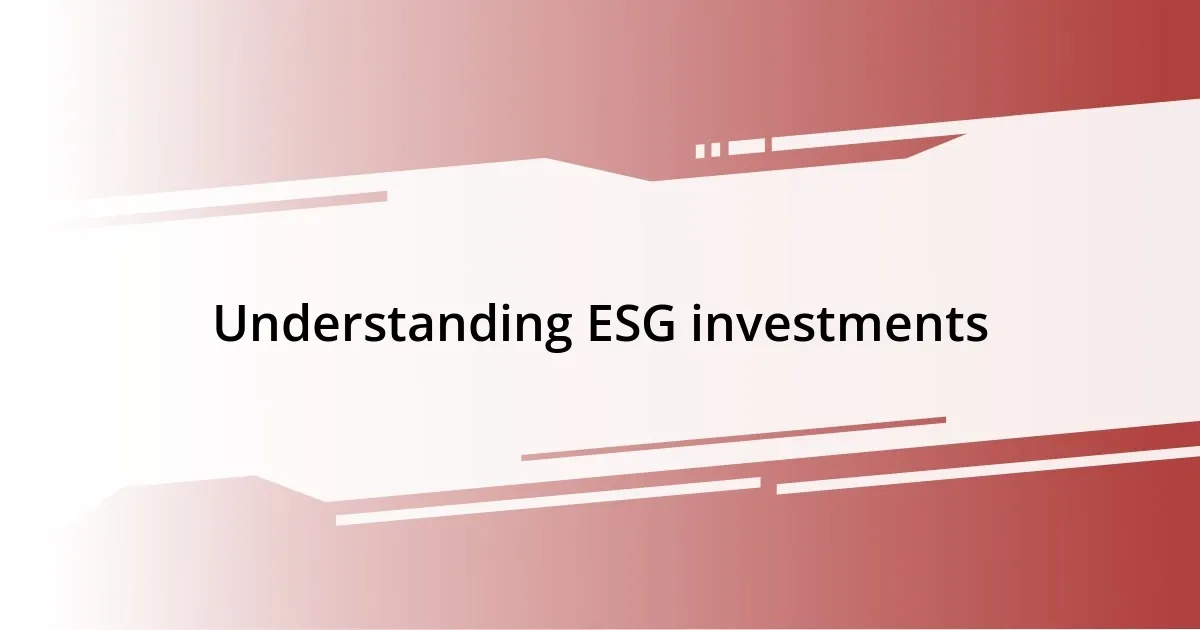
Understanding ESG investments
ESG investments focus on three key criteria: Environmental, Social, and Governance. I remember when I first delved into this area – it felt revolutionary, like I was discovering a way to align my financial goals with my values. Have you ever pondered whether your investments could contribute to a greener planet or a fairer society?
The beauty of ESG investing lies in its ability to evaluate companies not just by their financial performance but also by their social impact and ethical practices. I often ask myself, how can a company claim to be successful if it’s harming the environment or treating its employees poorly? For me, it’s about investing in businesses that contribute positively to society, something that feels deeply fulfilling.
When I consider the future, I see ESG investments as crucial for building a sustainable world. The emotional satisfaction that comes from knowing my money supports ethical practices is significant. Isn’t it empowering to think our investment choices can drive change and inspire greater corporate responsibility?
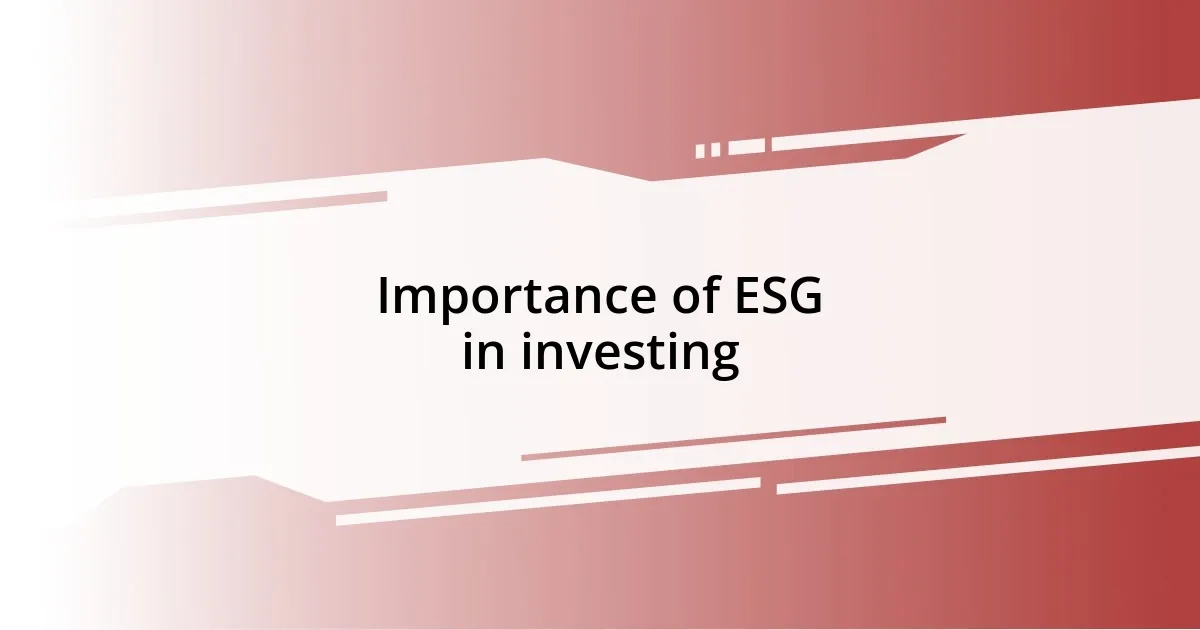
Importance of ESG in investing
ESG considerations in investing serve as a lens through which we can gauge the long-term viability of companies. Reflecting on my experience, I’ve seen firsthand how businesses prioritizing sustainability often outperform their less conscious counterparts over time. It feels reassuring to back entities that are not just chasing profits but also acting as stewards of the environment and champions of social equity.
Here are a few reasons why ESG is essential in investment decisions:
- Risk Management: Companies with strong ESG practices often face fewer regulatory risks and scandals.
- Performance Potential: Numerous studies show that firms that score well on ESG criteria tend to have better financial performance.
- Attracting Talent: Organizations committed to ESG attract motivated, talented employees who want to make a difference.
- Consumer Preferences: More consumers are choosing brands that demonstrate social responsibility, impacting sales and market share.
- Long-term Trends: As awareness around climate change and social issues grows, ESG-compliant companies are better positioned to thrive in future market landscapes.
In my journey with ESG investing, I’ve learned that it’s not merely about returns but about creating a legacy. I often think of my children and the kind of world I want to leave for them. Investing wisely means ensuring that the companies I support are contributing positively, shaping a sustainable environment for future generations.

Benefits of incorporating ESG factors
Incorporating ESG factors into investment strategies offers numerous advantages that resonate deeply with investors. One of the most striking benefits is enhanced risk management. Companies that embrace strong ESG principles typically exhibit lower volatility and fewer legal challenges. I recall a specific instance when my investment in a renewable energy firm paid off handsomely during a period of rising fossil fuel prices, emphasizing how a solid ESG strategy can provide a buffer against market unpredictability.
Moreover, my personal experience shows that ESG investments can yield impressive financial performance. It’s fascinating to see how companies committed to ethical practices often report better returns over time. When I made the conscious choice to divest from a traditional energy fund and redirect my resources into firms focused on sustainability, the returns exceeded my expectations. This decision not only benefited my portfolio but truly reflected my values, which was incredibly rewarding.
The social impact is also significant. Investing in ESG-oriented companies means supporting initiatives that can foster equality and environmental stewardship. I find it fulfilling to know that my investments help create jobs in marginalized communities or contribute to innovative solutions for climate change. It often sparks conversations with friends and family about the power of investing, reinforcing the idea that our financial choices can indeed make a significant difference.
| Benefit | Description |
|---|---|
| Enhanced Risk Management | Reduces volatility and lowers the likelihood of scandals and regulatory issues. |
| Improved Financial Performance | ESG-compliant firms often outperform traditional investments. |
| Positive Social Impact | Supports initiatives for equality and environmental stewardship. |
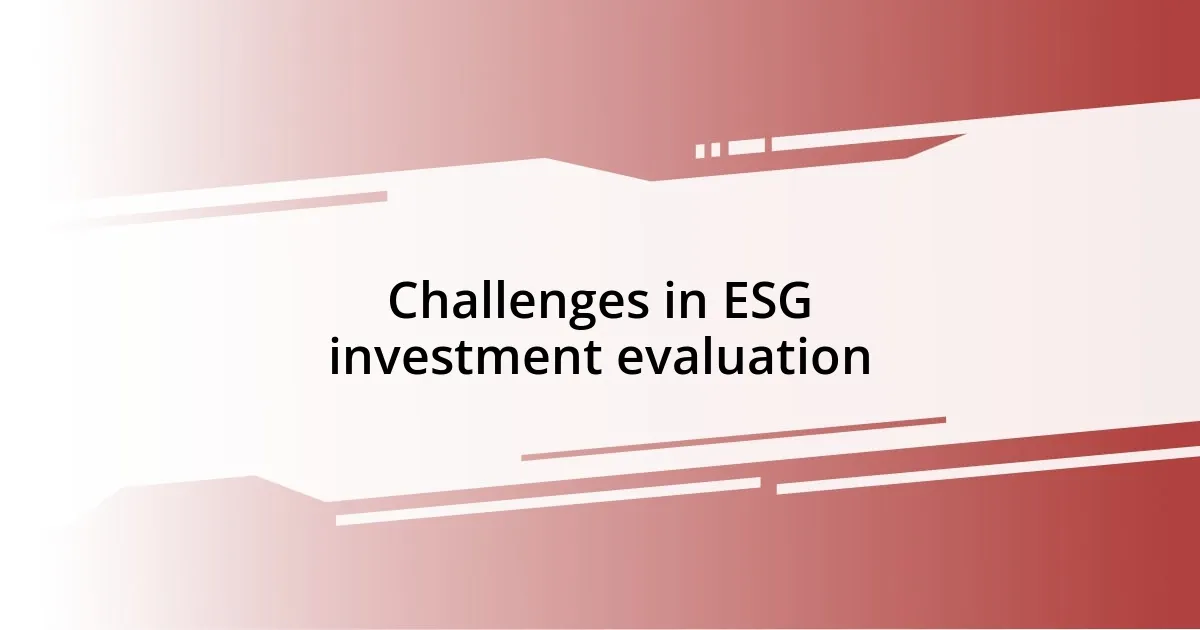
Challenges in ESG investment evaluation
Evaluating ESG investments presents unique obstacles that can feel overwhelming. One significant challenge I’ve encountered is the lack of standardized metrics for assessing ESG performance. Every firm uses different criteria and scoring systems, leaving investors like myself grappling with inconsistent data. How can I confidently allocate funds when I’m unsure if one company’s scoring truly reflects its practices or if another’s is merely a marketing gimmick?
Another difficulty is the subjectivity inherent in ESG analysis. My experience has shown me that what might be deemed a priority for one investor may not resonate with another. For instance, while I prioritize environmental factors in my portfolio, others might focus more on social equity or corporate governance. This variability can lead to disagreements among investors regarding which firms genuinely embody ESG principles, resulting in frustration rather than clarity.
Finally, there’s the issue of greenwashing, which can be particularly disheartening. I’ve seen companies tout their sustainable initiatives only to discover that their practices don’t align with their public image. It’s tough to navigate these deceptive claims and make informed decisions. This makes me wonder, how do we, as responsible investors, ensure that our choices are genuinely making a difference rather than simply lining the pockets of those who mislead us?
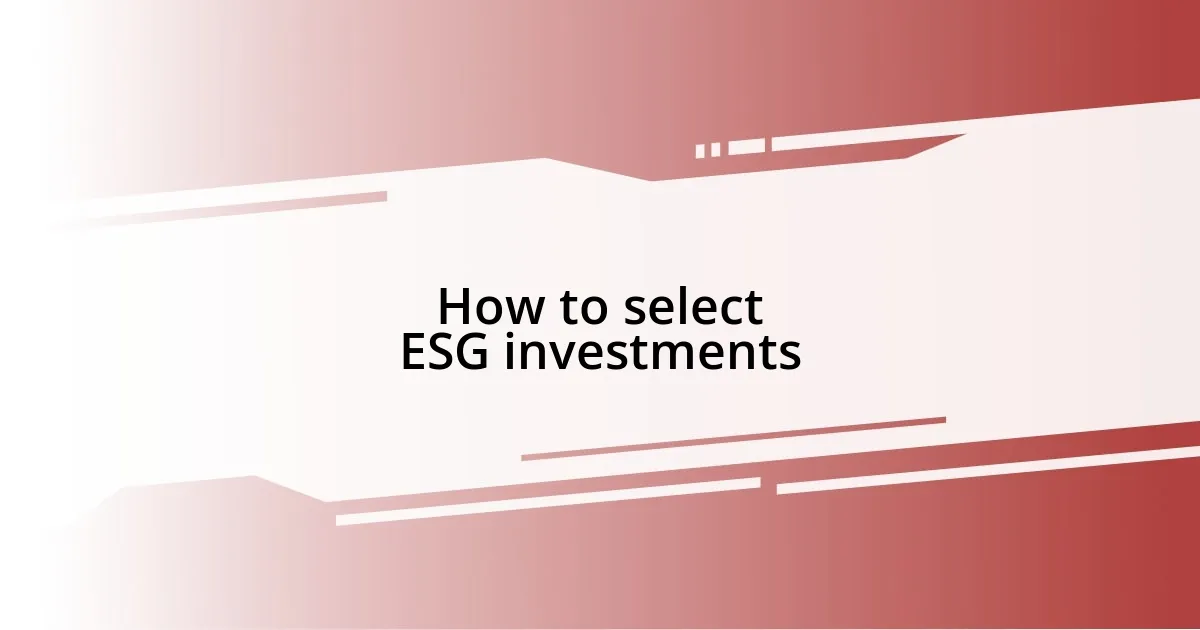
How to select ESG investments
When selecting ESG investments, I always start by researching a company’s ESG ratings and performance history. I’m often surprised at how easily accessible comprehensive reports are through platforms dedicated to this type of analysis. However, it’s vital to dig deeper. I remember encountering a promising tech firm with a high ESG score but later found that their supply chain practices were questionable, which left me feeling misled. It taught me the importance of looking beyond the surface.
Another practical step is aligning the investment choices with my personal values. For instance, I prioritize investments in companies that promote sustainable agriculture. During one particular investment round, I found myself clicking through various biotech companies. After some reflection, I chose to invest in a greenhouse startup that genuinely championed eco-friendly methods. By choosing investments that resonate with my ethical beliefs, I feel more empowered and connected to my financial decisions.
Lastly, engaging with community forums or ESG-focused investment groups can offer valuable insights. I’ve participated in several discussions that opened my eyes to companies I hadn’t considered before. Sometimes I wonder, what insights could I gain from sharing experiences with fellow investors? The diverse perspectives have enriched my understanding and often led to better, more informed investment decisions.
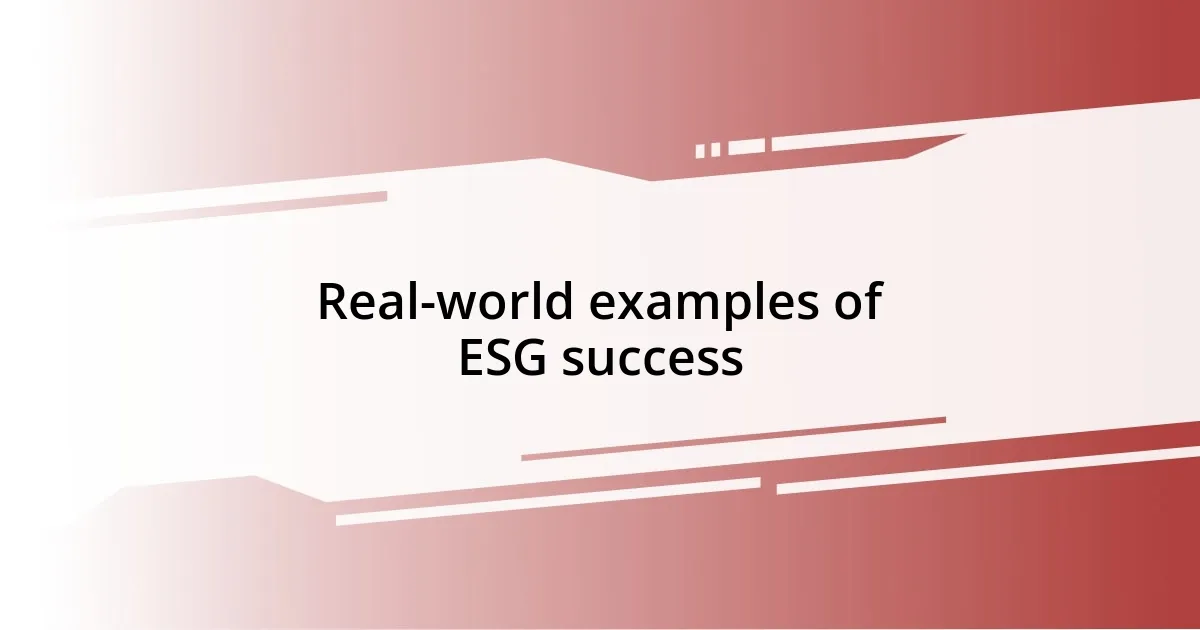
Real-world examples of ESG success
One of the standout examples of ESG success that I often reflect on is Unilever. I remember reading about their commitment to sustainable sourcing for their raw materials, with a target to derive 100% of their agricultural raw materials from sustainable sources. It was eye-opening for me to see a major multinational company genuinely working towards making a difference. When I found out that they managed to reduce their greenhouse gas emissions in manufacturing by 52%, it really pushed me to consider similar impactful companies in my portfolio.
Another inspiring instance comes from Tesla. I’ve been fascinated by their mission to accelerate the world’s transition to sustainable energy. Seeing their electric vehicles gain traction and their commitment to renewable energy solutions makes me wonder how traditional automakers will adapt. I can’t help but feel that investing in such companies isn’t just a financial decision for me; it’s a way to contribute to a more sustainable future. The notion that my investments can support a greener planet makes my choices feel that much more significant.
Then there’s the case of Patagonia, a company I admire not just for its outdoor gear but for its dedication to environmental activism. They’ve made headlines for their “Don’t Buy This Jacket” campaign, encouraging customers to reduce and recycle. This counterintuitive approach resonated with me on a deeper level. It challenges the conventional business model of encouraging excess consumption. When I learned how they commit a percentage of their profits to environmental causes, I felt inspired to seek out companies that prioritize purpose over profit. How often do you come across a business that truly puts its money where its mouth is?
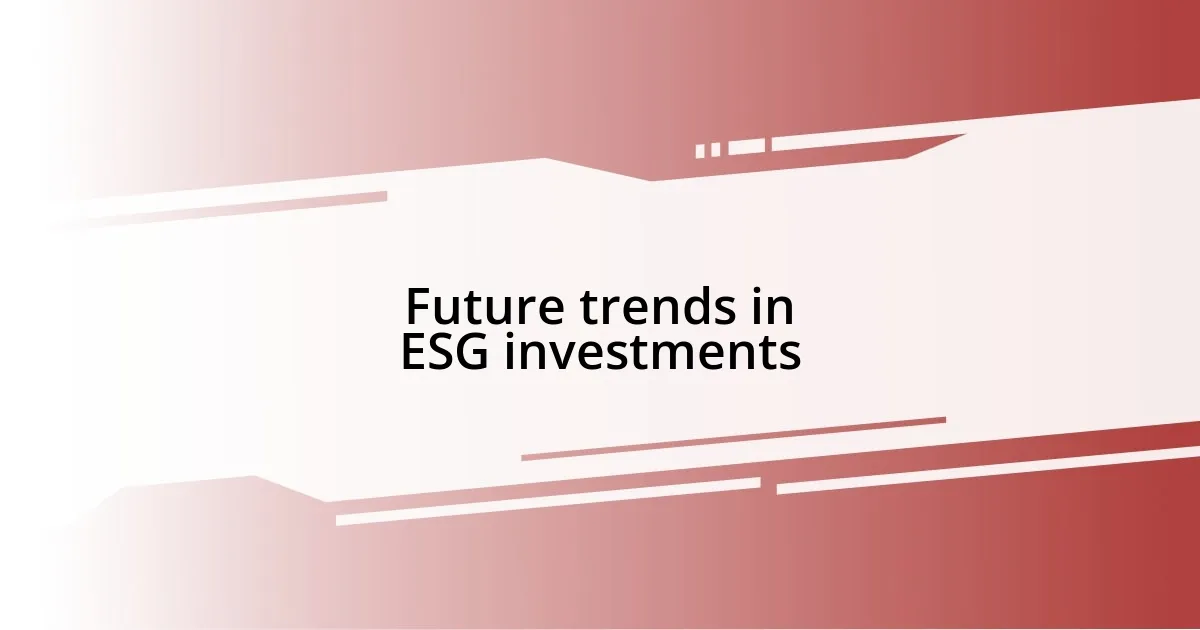
Future trends in ESG investments
As I look toward the future of ESG investments, I can’t help but sense a movement toward increased transparency. Investors are demanding clearer information around ESG metrics, and companies will have to step up their reporting game. I often find myself thinking: how much more effectively could we make decisions if data wasn’t just presented as a number but instead told a comprehensive story?
Another trend that has caught my attention is the rise of technology in assessing ESG factors. The development of AI and big data can potentially revolutionize how we evaluate companies. I remember my initial skepticism about whether algorithms could capture the nuances of social responsibility, but witnessing some platforms successfully analyze complex human behaviors has changed my perspective. Could employing such advanced tools help investors like me make decisions that are not just financially sound but also ethically informed?
I also anticipate a growing focus on community impact investments. More funds are looking at how investments affect local communities, beyond just environmental or governance metrics. I experienced this firsthand while attending a local investment meetup, where we discussed specific projects aimed at bolstering education in underprivileged areas. It really made me reflect on how finance could have a profound social impact, making me wonder: are we ready to redefine our understanding of success in investing?














